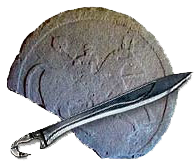Autor: Servan
sábado, 28 de abril de 2007
Sección: Artículos generales
Información publicada por: Servan
Mostrado 17.519 veces.
En el comienzo Dios creó el cielo y la tierra.
Bereshit bará Elohim 'et hashamajim v'et ha'aretz.
BERESHIT (be-reshit)
Se ha discutido por qué el Génesis empieza con una letra Beth (casa) y no un AliF.
Torah from Zion project:
"Bereshit...can also be read -as is done in the Zohar, not as the adverb "in the begining", but as a proper noun of a hidden entity who created God!
"Bereshit created Elohim -God" or, through the agency of "the beginning-reshit" God-Elohim was created."
Dice Sholem: "Though the medium (the prefixe be) of Hokhmah (called reshit), the first Sefirah -the force hidden within the third person singular of the word bara- produced by an act of emanation the third Sefirah (Binah), which is also called Elohim. Elohim (God) is thus then not the subject but the object of the sentence"
Curioso pensamiento que recuerda la gnosis.
BARA.
Las acciones divinas son descritas:
qanah (preparar, Gen. 14,19)
konen (afirmar, Is. 45, 18)
yasar (dar forma, Gen. 2,8)
P. van Imschoot (Théol. de l'Anc. Test.) dice: "Le verbe bârâ' à la forme gal et niphal n'emploie que pour désigner l'action de Dieu produisant un objet ou un prodige (Ex, 34.10) agregando:
"La création ex nihilo n'est exprimée formellement que par un texte grec récent (II Mcc. 7,28): "regarde le ciel et la terre, vois toute qu'ils contiennent, et sache que Dieu ne les a pas faits de choses existants".
En cambio, Tresmont toma bará estrictamente como crear (Essai sur la pensée hébraïque)
Dice Aron (Le Dieu des origines): "Selon le sens propre du verbe "bara", celui-ci a exercé son ingéniosité d'artisan".
Bará es un término de alfarero; Dios ha formado el mundo como un alfarero su pote; así forma al hombre. El pensamiento hebraico no es filosófico, epeculativo como el griego, no se plantea la creación ex nihilo.
El mundo es formado, ordenado de los despojos de la dragona Tiamat, del dragón Kinsu.
Debe notarse que el verbo bará es usado en singular (él formó) a pesar que el sujeto (Elohim) es plural.
ELOHIM
El es Dios en lenguas semitas (excepto el etíope).
Semita occidental El; acadio Ilu (v. mi artículo Sagitario); árabe Il, Ilah.
Quizá derivado de 'wl (ser fuerte).
Plural êlîm, elohim (¿dual?)
Es plural v.gr. en Ex. 18,11.
Bauer y Eichrodt piensan que tomaron este uso del plural, de los cananeos.
Se aplica también a los ángeles "hijos de Dios" (beney elohim), o a un profeta (1 Sam.2,27), así como Adonai es plural de Adon.
YHWH debe ser leído "Adonai". "Jeovah" es un barbarismo (s. XIII).
La forma plural Elohim es entendida por algunos como mayestática (Nos, dicen los reyes); sin embargo el Zohar habla específicamente de la trinidad divina:
"How can three names be one? But though the revelation of the Holy Spirit and with closed eyes, we know that the three are one. This is the mistery of the voice, the voice is heard only as a sound, yet it consists of three things: fire, wind and water, but all three are one as proven by the mistery of the voice"
Este es un misterio cabalístico muy apreciado por Mirandola y Ficino.
ET HASHAMAJIM V'ETHA' ARETZ
El pensamiento hebraico es muy pragmático; van Imschoot dice: "L'Ancien Testament n'a aucun mot pour désigner le mende. Il dit "le ciel et la terre".
P. Auvray (Sacred languages): "In hebrew, real abstracts are rare, and even those are used infrequently, especiallyin the classical period, and are often replaced by concrete plurals"
La forma "el cielo y la tierra" recuerda el sumerio ANU.NA.KI.
(
No hay imágenes relacionadas.
Comentarios
 Pulsa este icono si opinas que la información está fuera de lugar, no tiene rigor o es de nulo interés.
Pulsa este icono si opinas que la información está fuera de lugar, no tiene rigor o es de nulo interés.
Tu único clic no la borarrá, pero contribuirá a que la sabiduría del grupo pueda funcionar correctamente.
Si te registras como usuario, podrás añadir comentarios a este artículo.

No hay más información.
...0